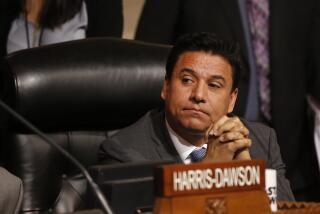3 Charges Dropped in Slavery Case
- Share via
A federal judge dismissed Monday a racketeering count against a Ventura County flower rancher charged with enslaving at least 60 Mexican laborers at his Somis compound during the 1980s.
The ruling by U.S. District Judge Consuelo B. Marshall prevents the government from confiscating about $5 million in property from rancher Edwin M. Ives if he is convicted.
Marshall also threw out two other counts in the 46-count grand jury indictment. The charges alleged that Ives’ employees were not paid overtime despite working 16 hours a day and that the workers received far less than the state minimum wage.
Though delaying a decision, the judge indicated that she may dismiss 15 other counts that allege Ives extorted smuggling fees from the workers before they could leave his compound.
The rulings were the latest in a series of setbacks for federal prosecutors, who allege that Ives and 10 co-defendants conspired to enslave laborers recruited from rural Mexican villages and forced them to work for about $1 an hour.
Since last fall, three judges have denied government motions to take witness testimony in Mexico City before trial, to freeze Ives’ assets before trial and to jail the rancher for allegedly conspiring to threaten and bribe witnesses.
“The significant thing is that once again the government has lost,” said Ives’ attorney Robert M. Talcott. “We’ve said from Day One that this is not a slave case, this is not a racketeering case, and when the final curtain comes down, I don’t know if it’s going to be anything at all.”
Ives, 54, his wife, Dolly, eight former Ives employees and an alleged smuggler are charged with a variety of labor and civil rights violations, mail fraud, witness tampering and extortion. Prosecutors have described the case as the largest ever filed under an 81-year-old federal anti-slavery statute.
On Monday, Assistant U.S. Atty. Carol L. Gillam acknowledged that Marshall’s rulings were setbacks. But she insisted that in dismissing the racketeering charge, the judge had committed a “clear error” that prosecutors may appeal.
The two dismissed labor counts can be reinstated easily by the grand jury after the language in the charges is clarified, Gillam said.
Nor does another Marshall ruling--that some documents seized at Ives’ ranches in Somis and Moorpark and his Los Angeles office cannot be used as evidence--substantially weaken her case, Gillam said.
“I am in a slightly worse position,” she said, though acknowledging that loss of the racketeering charge was significant.
Attorneys for both sides said Monday’s rulings mean that Ives and his co-defendants are in a better position to plea bargain.
Defense attorneys noted that many charges added when prosecutors expanded their indictment from 15 counts to 46 in January have now been dismissed or are being questioned by Marshall.
“This is the beginning of paring the case down to a more realistic point,” said Stephen Sadowsky, an Ives attorney.
Trial is set for September.
More to Read
Sign up for Essential California
The most important California stories and recommendations in your inbox every morning.
You may occasionally receive promotional content from the Los Angeles Times.













